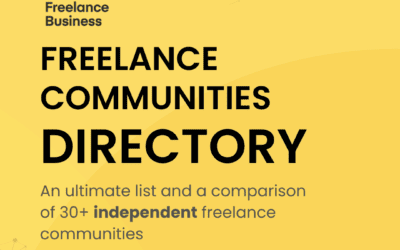Co-authored with Alexandros Ntolgkov
Crypto currencies and the wider blockchain and web3 revolution has spread through the world like wildfire. And when there is a new and exciting market, there often is a thirst for talent and fresh opportunities for the most active professionals. Traditional education and work experience often do not sufficiently prepare job seekers for Web3 jobs, which is where proactive independent professionals come into play. In this article, we will go over a few jobs in the blockchain and web3 sphere where freelancers can fill in the skill gaps.
Blockchain development / IT
This is one of the most fundamental skillsets in the blockchain world. It is also one of the most challenging ones. With new languages like Solidity (used in the Ethereum space) which are not usually taught in universities, fresh talent is needed, and flexible experts eager to learn new skills have an advantage. Blockchain developers need to know how to develop blockchain infrastructure, establish security protocols and potentially manage more junior developers.
Other programming and IT experts who have experience in blockchain are also needed. For example, as fraud and hacks are unfortunately common in the crypto world, many crypto projects are willing to pay high rates for security specialists who can ensure the assets of the users are safe, so if you are a security specialist, you will be able to negotiate high rates.
Community Management
If you know your way around a Discord server and can engage people in Twitter threads, then being a community manager can be for you. Community building is very important for Web3 projects and many companies are looking for great community managers. Your responsibilities can involve setting up Discord servers with the right channels, assign roles, use bots, and generally inspire engagement with members. Soft skills and community knowledge will help you stand out.
Crypto marketing and copywriting
It might seem like it, but blockchain is still not a household technology. There is still much of confusion and uncertainty around the emerging field, and many companies are looking for people to clearly communicate with customers.
Crypto marketing involves much of the responsibilities of other digital marketers – creating a marketing strategy, running social media ads, managing a CRM system and more. Mixing your marketing skillset with knowledge and experience of Web3 will make you highly desirable to clients. The success of crypto marketing agencies like Coinbound shows the popularity of the niche.
Copywriting is also popular, as people who can communicate the complicated technology of blockchain and the metaverse in an understandable way will find plenty of work.
Legal consultation
Many Web3 projects involve monetary transactions and the law is quickly catching up. Large countries already have legislations for crypto exchanges and other blockchain businesses and if your company falls outside of them, you may be in big trouble. This is why crypto businesses are willing to spend lots on lawyers and legal consultants to make sure their work is legitimate.
Keeping up to date with the evolving regulations is not an easy feat, but independent legal professionals can expect many small to medium clients to source their skills.
NFT Artist
Away from the flashy side of Beeple’s multimillion NFT deal and Bored Ape Yacht Club NFTs reaching hundreds of thousands of dollars, there are many smaller projects which mint and trade NFTs. Freelance artists can choose to focus only on creating stunning art which can be turned into an NFT, or they involve themselves further in the project and define the vision for an NFT drop, create the launch calendar and manage the project from start to finish. Many NFT collections involve procedural generation and working with minting technologies and platforms like OpenSea, which is something the average artist may not be familiar with. Here is where mixing artistic skills with crypto know-how can impress your clients and land you some fantastic opportunities.
Public Relations
As we mentioned, Web3 and blockchains are complicated for the everyday user. Different consensus mechanisms: Proof of Work, (PoW) Proof of Stake (PoS), Delegated Proof of Stake (DPoS), Pure Proof of Stake (PPoS), Proof of Burn (PoB), Proof of Capacity (PoC), Proof of Identity (PoI), Proof of Activity (PoA), Byzantine Fault Tolerance (BAFT), Proof of Elapsed Time (PoET) are just a small number of consensus mechanisms, each with their advantages and disadvantages and use cases. Additionally, you have different ways for crypto ventures or projects to raise money: ICOs (Although ICOs are not used anymore), IDOs, IEOs, ZKrollups, Crowdloans and more. Other terms in Blockchains like faucets, bridges, parachains, paraslots, sidechains, cold wallets, hot wallets, hosted wallets and others need to be translated by a Public Relations specialist in a way that can create a media story and sound interesting to journalists that are not versed in crypto to cover the story which is very difficult to do in the industry.
On-chain Analysis
Unlike in Traditional Finance where everything is opaque and closed-off in terms of financial transparency, which allows for high amounts of money-laundering amongst others, public blockchains like Bitcoin, Ethereum, Polkadot and others are transparent. This means anyone can see the transfers being done in real-time from one wallet to another. One simple tool to start exploring this – although there are more specialised ones as well – is Blockchain.com’s block explorer. Or for Ethereum Etherscan as well as Glassnode for more general chains and information. In such tools, one can see live transactions taking place as well as the number of active wallets currently and in the past, how they grew, the hash rate of the Bitcoin network,Total Value Locked (TVL) in DeFi and other data which can help someone to analyse the growth or shrinking of each blockchain.
Event Organisers, Translators and anything you can think of that benefits the community:
If you are passionate about crypto, blockchain or even a specific blockchain and would like to share your passion with other people by educating them, then you can organise a local event wherever you are in the world. Blockchain Foundations provide funding to people willing to take up leadership and organise something for their favourite community locally, which is a great opportunity for freelancers.
For example, on PolkaAssembly members of the Polkadot community submit proposals about events or any projects they may want to take up on for the benefit of their own community. This can range from organising events, creating courses, building something technical, translating parts of the Polkadot ecosystem in one’s own language and any other idea one may have to benefit the network. Grant distribution is not done by a central one entity like a CEO or something like that but by a committee that is elected and voted upon by the thousands of Polkadot community members themselves and if granted, then by providing your polkadot wallet, one will receive funding for the project they want to help build.
ther networks do the same with their own communities – although grant distribution processes range from fully decentralised like Aave, Uniswap or MakerDAO where the whole community – usually more than 100,000 people vote upon funding a project that helps their ecosystem – to entirely centralised where a number of few people decide whether a grant should be administered to a project. Thus, pick your favourite project or blockchain and try to help them develop their community further!
Nobody knows where the blockchain revolution will take us, but with 81 out of top 100 companies already using blockchain technology, the future seems exciting and this emerging technology can become a large part of our lives. Getting experience early on will put you one step ahead in the future job market and put you in the forefront of revolutionising the world.




